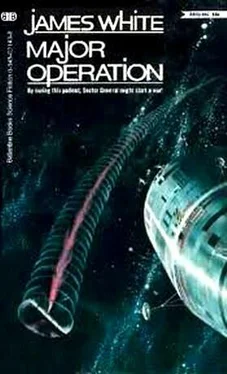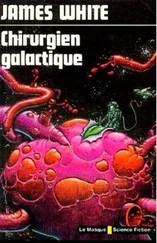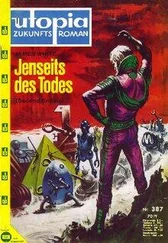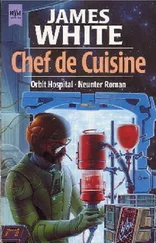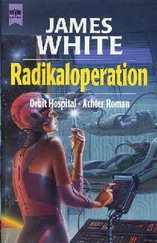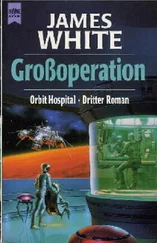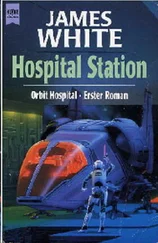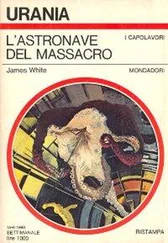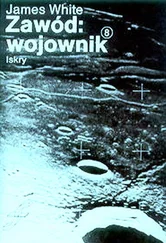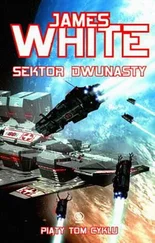The reason for this topsy-turvy arrangement was a deep, sex-based revulsion toward all blood relations. Since the rollers of Meatball had evolved in a fairly small and confined area and had been forced to move continually within this area, physical contact for mating purposes-a wholly instinctive affair in presapient times-was much more likely to occur between relatives than complete strangers, they had evolved an effective safeguard against inbreeding.
Surreshun’s species reproduced hermaphroditically. Each parent after mating grew their twin offspring, one on each side of their bodies like continuous blisters encircling the side walls of a tire. Injury, disease or the mental confusion immediately following birth could cause the parent to lose balance, roll onto its side, stop and die. But this type of fatality occurred less frequently now that there were machines to maintain the parent’s rotation until it was out of danger. But the points where the children eventually detached themselves form their parents remained very sensitive areas to everyone concerned and their positions were governed by hereditary factors. The result was that any close blood relation trying to make mating contact caused itself and the other being considerable pain. The rollers really did hate their fathers and every other relative. They had no choice.
… And the very brief period of courtship,” Conway added in conclusion, “explains the apparent boastfulness we have observed in Surreshun. During a chance convergence on the sea bottom there is never much time to impress an intended mate with the strength and beauty of one’s personality, so that modesty is definitely a no survival characteristic.”
The Captain gave Surreshun a long, thoughtful look, then turned back to Conway. “I take it, Doctor, that our friend, because of the long training and discipline necessary to its becoming Meatball’s first astronaut, belongs to the lowest social stratum even though unofficially it may be quite well thought of?”
Conway shook his head. “You’re forgetting, sir, the importance- again this is tied in with the avoidance of inbreeding-which these people place on the far travelers who bring back new blood and knowledge. In this respect Surreshun is unique. As the planet’s first astronaut it is top dog no matter which way you view it-it is the most respected being on its world and its influence is, well, considerable.”
The Captain did not speak, but his features were stretching themselves into the unusual, for them, configuration of a smile.
“Speaking as one who had been inside looking out,” said Conway, “you can be sure that it doesn’t hold a grudge over being kidnapped-it feels obligated to us, in fact-and that it will cooperate during contact procedure. Just remember, sir, to stress our differences to these people. They are the strangest species we have encountered-which is literally true. Be especially careful not to talk about us all being brothers under the epidermis, or that we belong to the great, galaxy-wide family of intelligent life. 'Family' and 'brother' are dirty words!”
Shortly afterward Williamson called a meeting of the cultural contact and communications specialists to discuss Conway’s new information. Despite the poor translation facilities available on Descartes, by the time the watch-keeping officers in the control room had been relieved for the second time they had completed plans for making contact with the natives of Meatball.
But the senior cultural-contact specialist was still not satisfied-he wanted to study the culture in depth. Normal civilizations, he insisted, were based upon the extension of family ties to tribe, village and country until eventually the world was untied. He could not see how a civilization could rise without such cooperation at family and tribal level, but he thought that a closer study of personal relationships, might clarify things. Perhaps Doctor Conway would like to take the Surreshun tape again?
Conway was tired, irritable and hungry. His reply was forestalled by Major Edwards who said, “No! Definitely not! O’Mara has given me strict instructions about this. With respect, Doctor, he forbids it even if you are stupid enough to volunteer. This is one species whose tapes are unusable. Dammit, I’m hungry and I don’t want more sandwiches!”
“Me, too,” said Conway.
“Why are doctors always hungry?” asked the CC officer.
“Gentlemen,” said the Captain tiredly.
“Speaking personally,” Conway said, “it is because my entire adult life had been devoted to the unselfish service of others and my wide powers of healing and surgical skill instantly available at any time of the day or night. The tenets of my great and altruistic profession demand no less. These sacrifices-the long hours, inadequate sleep and irregular meals-I suffer willingly and without complaint. If I should think of food more often than seems normal for lesser beings it is because some medical emergency may arise to make the next meal uncertain and eating now will enable me to bring a greater degree of skill-even laymen like yourselves must appreciate the effect of malnutrition on mind and muscle- to the aid of my patient.”
He added dryly, “There is no need to stare, gentlemen. I am merely preparing my mind for contact with Surreshun’s people by pretending that modesty does not exist.”
For the remainder of the voyage Conway divided his time between Communications and Control talking to the Captain, Edwards and Surreshun. But by the time Descartes materialized inside the Meatball solar system he had gained very little useful information on the practice of medicine on the planet and even less about its medical practitioners.
Contact with his opposite numbers on Meatball was essential for the success of the assignment.
But curative surgery and medicine were very recent developments which had become possible only when the species learned how to rotate while remaining in one position. There were vague references to another species, however, who acted as physicians of sorts. From Surreshun’s description they seemed to be part physician, part parasite and part predator. Carrying one of them was a very risky business which very often caused imbalance, stoppage and death in the patient’s continually rotating body. The doctor, Surreshun insisted, was more to be feared than the disease.
With the limited translation facilities it was unable to explain how the beings communicated with their patients. Surreshun had never met one personally nor was it on rolling-together terms with anyone who had. The nearest it could express it was that they made direct contact with the patient’s soul.
“Oh Lord,” said Edwards, “what next?”
“Are you praying or just relieving your feelings?” asked Conway.
The Major grinned, then went on seriously, “If our friend uses the word ’soul' it is because your hospital translator carries the word with an equivalent Meatball meaning. You’ll just have to signal the hospital to find out what that overgrown electronic brain thinks a soul is.”
“O’Mara,” said Conway, “will begin wondering about my mental health again …
By the time the answer arrived Captain Williamson had successfully made his apologies to the Meatball non-authorities and Surreshun had painted such a glowing picture of the utter strangeness of the Earth humans that their welcome was assured. Descartes had been requested to remain in orbit, however, until a suitable landing area had been marked out and cleared.
“According to this,” said Edwards as he passed the signal flimsy to Conway, “the computer’s definition of ’soul' is simply 'the life of principle.' O’Mara says the programmers did not want to confuse it with religious and philosophical factors by including material or immortal souls. So far as the translation computer is concerned if a thing is alive then it has a soul. Apparently Meatball physicians make direct contact with their patients’ life-principle.”
Читать дальше
